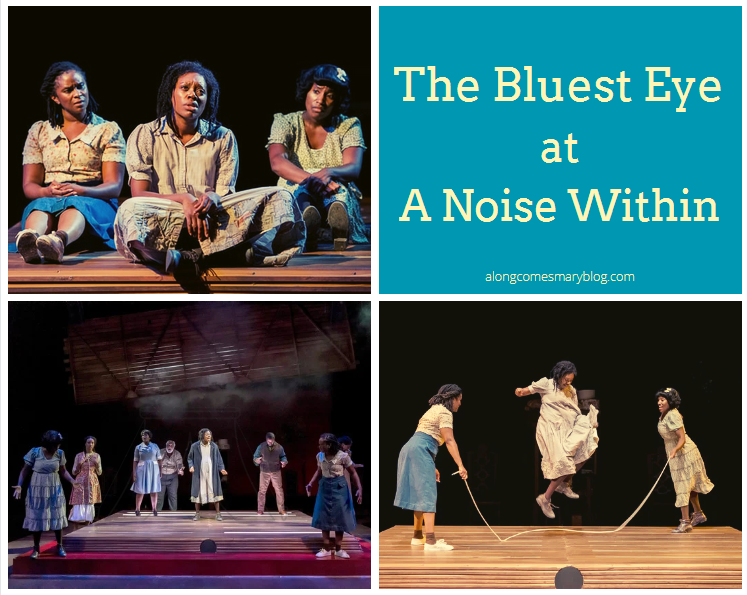The Bluest Eye at A Noise Within
I vividly remember reading Toni Morrison’s The Bluest Eye when I was a teenager. I’d bought a hardcover copy at one of my favorite thrift stores in Solvang. I think it cost me a quarter. I’d discovered the works of strong Black women like Alice Walker and Maya Angelou. Yet something struck me differently as I read Morrison’s the Bluest Eye. Being a young white woman I was certainly aware of my privilege and at times found myself downright uncomfortable as I read through the pages of her debut novel. Her words got me to my core. I realized that even though I felt intense empathy for the characters I’d never truly be able to grasp the pain people of color have endured and continue to.
The Bluest Eye was adapted for stage in 2006 by Lydia R. Diamond with Morrison’s blessing. It’s currently being performed through September 24th at Pasadena’s A Noise Within. I was honored to attend this week and cannot shake how compelling it was.
Since the wake of 2020, many have vowed to be more inclusive and make change. A Noise Within is proving that they’re not afraid to “walk the talk” and showcase Black stories that need to be told. Even if they leave us uncomfortable and rigid.

Kacie Rogers, Akilah A. Walker, and Mildred Marie Langford. Photo by Craig Schwartz

Ensemble. Photo by Craig Schwartz
The Bluest Eye at A Noise Within
The Bluest Eye takes place in 1940s Ohio. Sisters Claudia (Kacie Rogers) and Frieda (Mildred Marie Langford) are adjusting to their friend, Pecola (Akilah A. Walker) living with them. Pecola comes from an abusive home and her father, Cholly (Kamal Bolden), in a fit of rage, has burned down their home. Her mother, Pauline (Julanne Chidi Hill), is a maid for an affluent white family that lives near a park. Blacks are not allowed inside the park and instead must walk the outside perimeter to get to the mansion.
Claudia serves as a narrator of sorts. Through action and her interludes, the audience learns much about the life of Pecola. She is 11 years old and dreams of being a white little girl like her idol, Shirley Temple. Pecola is certain that if only she had blue eyes then she would be beautiful and at last loved. Rogers shines as Claudia; especially in a scene when we learn why she wasn’t pleased to receive a white baby doll for Christmas.
She directs several questions towards the audience. I attended on Black Out Night and the nods and agreements from the audience as Claudia posed questions were astounding. It’s clear we continue to have a long way to go for equality.
During the hour and 40 minutes play we go on a journey no one should ever have to. Yet, sadly, the events that occur are ones that many, specifically those of color, have endured and know all too well.
The Dynamic Cast
The cast of the Bluest Eye is hands down some of the best performances I’ve ever seen in my nearly 20 years of attending live theatre. Yes, it is that good and powerful. The book has been banned in several states and this is the needed wake-up call for why books should not be forbidden. How, as a society, can we move forward unless we get a glimpse into the lives of people of color? If the powers that be feel it’s too “uncomfortable” for children to read these works then imagine how those who have been through such acts of racism and violence feel.
Akilah A. Walker as our protagonist, Pecola, is maginificant. Walker has mastered such a delicate balance of portraying a child who is forced to become an adult much too soon. In one particularly haunting scene, Pecola sheepishly goes to the drugstore to buy Mary Jane candies. It’s clear that the white man behind the counter doesn’t want her there and for no reason, reluctantly, sells her the candy but only after a hostile exchange.
Back at school, the girls are both in awe and disgusted at the new girl, Maureen (Alexandra Metz). Maureen is a light-skinned, green-eyed half-Black girl also Pecola’s age. She considers herself to be above the dark-skinned African-American people. While Pecola somewhat idolizes her, Frieda and Claudia mock Maureen. They call her “meringue pie” and pick fights with her. How can you blame them?
Metz, like each cast member, truly transforms you into their character. I could empathize with Maureen but also shared the sister’s dislike of her. We’re bound to be both braggy and an instigator at this age. Maureen also turns the story as we’re first introduced to the idea that perhaps things are not right between Pecola and her father.

Julanne Chidi Hill, Kamal Bolden, Alexandra Metz and Crystal Jackson. Photo by Craig Schwartz

Alex Morris, Akilah A. Walker. Photo by Craig Schwartz
Book Your Tickets Now
Directed to perfection by Andi Chapman, the play allows the cast to create much of the space and props with their movement alone. The simple set design by Fred Kinney is bare and leaves room for interpretation. When they’re not performing, the actors sit behind the stage in large, high-back chairs that evoke a Southern plantation.
The Bluest Eye is a play that should not be missed. I cannot encourage everyone enough to attend a performance. Tickets start at $29 and students at $18. Gather a group of 10 or more and receive a discount. It’s definitely a show for mature audiences but one near everyone should see and start a discussion for change. Learn more and book your tickets HERE.
Comments are closed.

Jennifer
September 18, 2023 at 7:58 pmGreat review! It sounds like a very thought-provoking play and I’m intrigued by it. I’d love to see it!